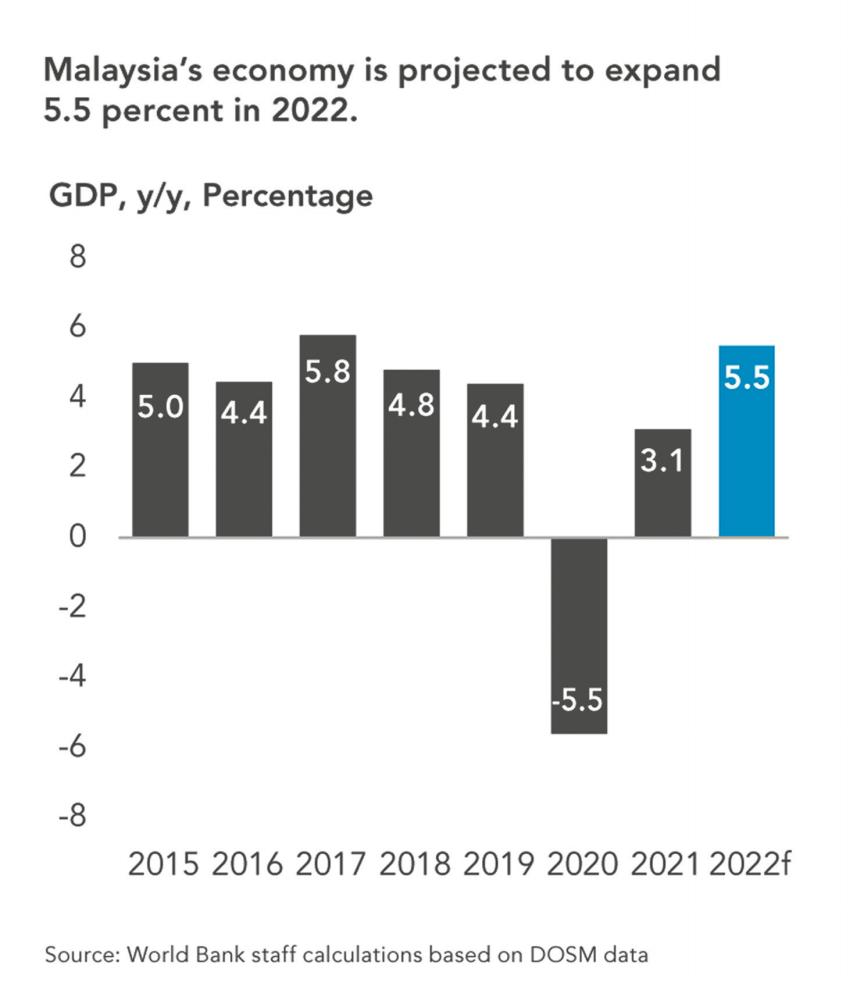PETALING JAYA: Malaysia’s economy is projected to expand 5.5% this year, driven mainly by a strong rebound in consumption, according to a World Bank report released today.
The World Bank’s June 2022 Malaysia Economic Monitor report said the country’s economy grew at 3.1% in 2021. It forecast that Malaysia’s economy is projected to grow by 4.5% in 2023 and 4.4 % in 2024.
The report said Malaysia’s fiscal policies must strike a balance between increasing revenues, spending efficiently, and ensuring sufficient social protection for lower-income groups to encourage comprehensive growth.
In the short term, the World Bank report said, fiscal policy should be focused on maintaining financial support for the poor and vulnerable and establishing a more inclusive social protection framework with better targeting. The government’s various cash assistance programmes throughout the pandemic have provided important support to households. However, the World Bank’s High-Frequency Phone Survey revealed that these cash assistance programmes did not reach nearly a quarter of those earning RM2,000 or less month.
While higher fiscal spending in response to the Covid-19 pandemic has helped support the economy, it has led to further narrowing of the fiscal space. Efforts to rebuild fiscal buffers through increased revenue collection and enhanced spending efficiency should remain a key policy priority. However, because the economic recovery is still in its early stage, medium-term fiscal consolidation has to be tackled gradually.
The report highlights challenges constraining economic development in lagging states, namely Kedah, Perlis, Kelantan, Sabah, and Sarawak, characterised with the lowest average income/highest poverty rate. The report finds that some barriers to growth in these states could be addressed through deepening federal-state collaboration under an explicit policy framework for addressing specific challenges of lagging states.
“With the right governmental support systems and prudent fiscal steps in place, Malaysia’s economy can expand beyond a return to pre-pandemic levels, towards achieving significant long-term development goals,” it said.
Meanwhile, World Bank Group lead economist Dr Apurva Sanghi (pix), when asked if Bank Negara Malaysia (BNM), is expected to raise interest rates further this year, said he believes BNM is more concerned about stability and volatility than maintaining the Malaysian ringgit per se.
“We therefore expect future movements in the OPR (overnight policy rate) to be largely driven by domestic economic conditions to respond to forex (foreign exchange) volatility, preferably at a gradual and measured pace”, he told reporters at a virtual media briefing in conunction with the release of the World Bank report .
Separately, World Bank country director for Brunei, Malaysia, the Philippines and Thailand Ndiame Diop said as recovery becomes more entrenched, policy needs to refocus on addressing the fiscal impact of the Covid-19 crisis through increased revenue collection and greater spending efficiency.
“Beyond rebuilding fiscal buffers, new growth opportunities could be seized in the post-pandemic world. For example, Malaysia can step up efforts to address some of the main constraints facing the development of Malaysia’s services sector and reinvigorate private investment,” he said in a statement.













